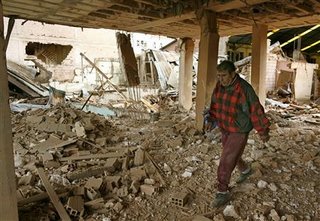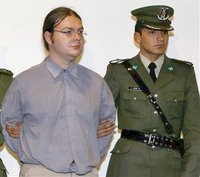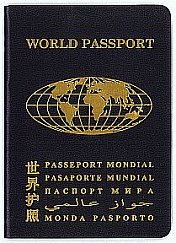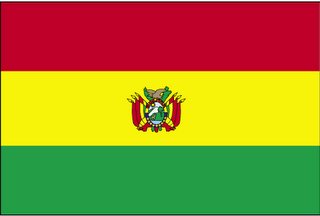grey-eyed man of destiny
To what extent will the United States interfere with the political climate in Bolivia? We beg that question following recent acts of terrorism in the capital city of La Paz.
Early Wednesday morning (3.22.06) two hotels in La Paz were rocked by explosions that left two dead and four wounded. An American man and a Uruguayan woman were arrested in connection with the explosions.
One of the blasts was caused by C4 – a highly powerful explosive. According to La Razon, the C4 may be of Israeli origin. Early reports have proven true that the couple was using non-government issue passports for entry & exit to most countries.
The story has already inspired vast amounts of coverage in international and national media, with many headlining the arrest of an American perpetrator who calls himself "Lestat Claudius de Orleans y Montevideo" (aka Triston Jay Amero).
The facts of the case are still forthcoming, yet the available information points to the possibility of persons known in some form by the United States' various intelligence services.
Although Bolivians are zealous activists - even to the point of blockading roads and disrupting the flow of goods and services - random violence of this sort has not historically occurred within the country.
Bolivia is far removed from Arab interests and Muslim-sponsored terrorism as less than o.o1% of Bolivians are followers of Islam, while modern narco-terrorism is limited mostly to Colombia.
By examining the preliminary information and looking at the political history of the country, it is highly suspect that this terrorist act was executed without the working knowledge of an international organization like the Central Intelligence Agency. The U.S. intelligence community should have known of an American - who has vocally renounced his citizenship - using a quasi-legal passport to enter countries under an assumed name while traveling with a military grade plastic explosive.
 Since Evo Morales assumed the Presidency, the United States’ military interests in Bolivia have been severely jeopardized. One of Morales’ first acts as president, was to bypass 28 military commanders for promotion as his administration investigated the secret removal of shoulder-fired anti-aircraft missiles to the United States.
Since Evo Morales assumed the Presidency, the United States’ military interests in Bolivia have been severely jeopardized. One of Morales’ first acts as president, was to bypass 28 military commanders for promotion as his administration investigated the secret removal of shoulder-fired anti-aircraft missiles to the United States.
The missle scandal inspired the Bolivian Attorney General’s office to call for the indictment of former President Eduardo Rodriguez, the defense minister and supreme military commander on treason charges.
Morales’ new military appointments are not trusted by the Pentagon and in response the U.S. has demanded the return of sensitive arms and equipment provided to Bolivia’s counterterrorism force.
By resisting the Bush administration’s demand to grant U.S. officials and soldiers immunity from prosecution by the International Criminal Court, Bolivia lost 96% of its military aid from the United States.
Additionally the U.S. has declassified the country as an anti-terrorism partner. As such Bolivia’s anti-terrorism force will lose about $300,000 for U.S. sponsored training programs. It would seem after such an event, that reducing the funding to prevent terrorist attacks may prove to be a "penny wise & pound foolish".
Some local media have suggested that the latest events in La Paz may be a covert process of U.S. involvement in Bolivian politics. 
In the least, it would seem most to indicate yet another U.S. Homeland Security failure to identify Mr. Amero's dubious travel documents & prevent his exit from the United States, possibly with high-grade explosives.
Bolivia had been enjoying a relative socio-political calm in the current political transition, an American disturbing that peace with terrorism, at the price of two lives is tragically ironic & should remain wholly unacceptable.






